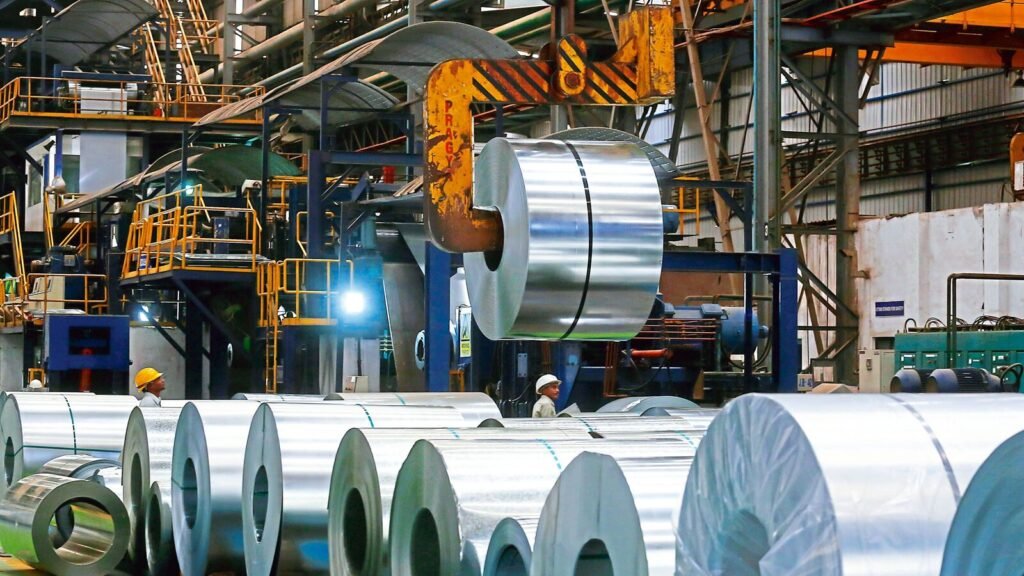India plans ‘safeguard duty’ to protect steel companies from cheap imports

New Delhi: The Indian government is considering a safeguard duty on steel imports to curb the influx of cheap steel into the country and protect the domestic industry. Imported steel, especially from China, costs about 30% less than domestic steel even with customs duty factored in, according to industry estimates.
Discussions on the duty will begin once the steel industry proposes a duty structure to protect them from such imports. Companies say cheaper imports—not just from China but also countries such as Japan and South Korea—have hit their bottom lines and could hinder their expansion plans, two officials told Mint.
“The proposal from the industry is likely to come in two weeks,” said a senior government official, who did not wish to be identified.
After receiving the proposal, the Directorate General of Safeguards (DGS) will start to investigate the impact cheaper steel imports on the domestic industry. “Once the impact is ascertained, DGS will recommend the imposition of duty, which can be done retrospectively,” said one of the two officials cited above. The official explained that the investigation may take four to six months, but the duty will be imposed from the date the probe began.
The duty may be in the range of 8-12%, officials said. The industry, however, wants it to be around 25%—similar to that imposed by the US to restrict imports from China.
Also read: India’s steel prices plunge to four-year low, most affordable since covid-19 pandemic
The safeguard duty is a temporary measure and can enforced for a maximum of two years. But this period can be extended after a review.
Emails sent to the steel ministry and steel secretary Sandeep Poundrik did not elicit an immediate response.
Why not raise customs duty?
Officials explained that the safeguard duty is being considered as it is faster to implement and provides the results industries require for protection. They added that a substantial share of imports is through free trade agreements (FTAs), so raising customs duty won’t help curb these.
A safeguard duty, however, applies to all imports and is complaint with all international trade pacts, they said.
Indian steel imports grew by a staggering 41.3% between April and September to 4.7 metric tonnes (mt) of steel, government data showed. China was the biggest contributor to this growth, accounting for 31% of total imports at 1.46 mt, followed by South Korea at 26% or 1.2 mt, and Japan at 24% or 1.1 mt.
Vietnam, which is being used by Chinese companies to export steel, accounted for 8.4% of total Indian imports, or 40,000 mt, during the same period. Various government departments have flagged the rise in imports from this country.
Also read: How India can fix the Chinese imports problem
India, which used to be a net exporter of steel, turned into a net importer by the end of FY24 and the trend has continued in this fiscal year. These cheaper imports have put pressure on prices and hit bottom lines of steel companies.
Government data showed that India exported 3.6 mt of steel in the first six months of FY25, registering growth of 35.9% year-on-year.
India has previously imposed a safeguard duty on steel a few times. It has also taken measures such as an anti-dumping duty on certain steel products and a tariff rate quota to check cheaper imports and as a retaliatory measure against duties imposed by other countries. The DGS last recommended a 20% safeguard tariff on certain steel products in 2015.
Much-needed step, companies say
Companies have welcomed the plan, saying such measure is required to prevent the dumping of cheaper steel.
“These cheaper imports, especially from China, are not the best quality but the Indian industry buys it since it’s cheap. If this trend continues, Indian companies may have to reconsider their expansion plans. This will be a much-needed step in the right direction,” said an executive at a large producer of long steel that is used in infrastructure projects.
A.S. Firoz, a steel industry expert and former chief economist at the ministry of steel, said, “Steel is a cyclical industry and the current conditions require duty protection for the domestic industry against dumping of cheaper steel. A safeguard duty is the best bet as it would cover all countries and check cheap imports. However, even a safeguard duty will take some time to materialise.”
Also read: China’s real estate stimulus to aid Indian steelmakers but oversupply persists
“It would be best to raise the basic customs duty or the most favoured nations duty rate from 7.5% to 15% immediately and then wait for safeguard investigations to be completed, after which that duty should also be levied. Total duty protection of 25-30% is required now. The domestic steel industry should also organise itself to become more competitive through new investments and modernisation.”
India’s steel production capacity is 140 mt a year and has a target of 300 mt of crude steel capacity by 2030-31, according to the National Steel Policy 2017.
The Directorate General of Trade Remedies (DGTR) under the commerce ministry is already carrying out an investigation to ascertain the amount of steel dumping and the need for anti-dumping duties on certain product categories. But this is a lengthy process that usually takes about a couple of years to complete.
A plan to raise basic customs duty on steel was also discussed between the steel and finance ministries but was shot down as it would have failed to prevent imports from countries with which India has free trade agreements, which account for around 75% of steel imports.








